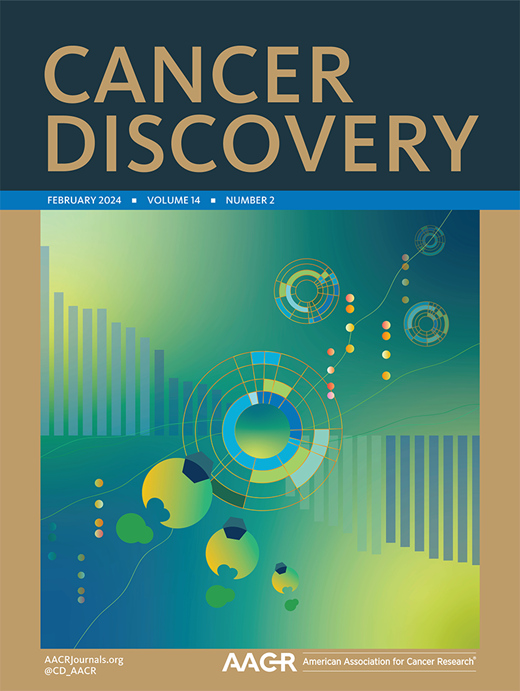胞质磷脂酶A2决定应激颗粒的细胞间异质性和化疗反应
IF 29.7
1区 医学
Q1 ONCOLOGY
引用次数: 0
摘要
癌细胞的异质性是一个主要的治疗挑战。在这里,我们发现癌细胞群体中的单个细胞在应激适应细胞器,应激颗粒(SGs)的水平上表现出显著的异质性,并证明SG的异质性是由细胞周期状态决定的。具体来说,由于Caspase 3的非凋亡功能与钙依赖性磷脂酶A2 (cPLA2)介导的促sg分子15-脱氧- δ -前列腺素j2 (15d-PGJ2)的产生之间的相互作用,g2期细胞中sg的形成明显增强。我们证明,在G1/S期,Caspase 3切割和灭活cPLA2,而在g2期,Caspase 3活性被抑制,导致cPLA2活性增强和15d-PGJ2上调。我们发现细胞周期依赖的SG异质性是胰腺导管腺癌(PDAC)的一个特性,通过抑制cPLA2靶向G2-SGs可使PDAC对诱导g2阻滞的化疗药物敏感。我们的研究结果强调了细胞周期依赖性SG形成是SGs的基本特性,是癌症异质性的关键方面,也是癌症治疗的靶点。本文章由计算机程序翻译,如有差异,请以英文原文为准。
Cytosolic Phospholipase A2 determines Intercellular Heterogeneity of Stress Granules and Chemotherapy Response
Cancer cell heterogeneity is a major therapeutic challenge. Here, we identify that individual cells within cancer cell populations show significant heterogeneity in the levels of the stress-adaptive organelles, stress granules (SGs), and demonstrate that SG heterogeneity is dictated by cell-cycle state. Specifically, SG-formation is distinctively heightened in cells in G2-phase due to the interplay between a non-apoptotic function of Caspase 3 and calcium-dependent phospholipase A2 (cPLA2)-mediated production of the SG-promoting molecule, 15-deoxy-delta-prostaglandin-J2 (15d-PGJ2). We demonstrate that in G1/S phase, Caspase 3 cleaves and inactivates cPLA2, whereas in G2-phase, Caspase 3 activity is suppressed, resulting in enhanced cPLA2 activity and 15d-PGJ2 upregulation. We show that cell-cycle-dependent SG heterogeneity is a property of pancreatic ductal adenocarcinoma (PDAC) and targeting G2-SGs by inhibiting cPLA2 sensitizes PDAC to G2-arrest-inducing chemotherapeutics. Our findings highlight cell-cycle-dependent SG formation as a fundamental property of SGs, a key aspect of cancer heterogeneity, and a target for cancer treatment.
求助全文
通过发布文献求助,成功后即可免费获取论文全文。
去求助
来源期刊

Cancer discovery
ONCOLOGY-
CiteScore
22.90
自引率
1.40%
发文量
838
审稿时长
6-12 weeks
期刊介绍:
Cancer Discovery publishes high-impact, peer-reviewed articles detailing significant advances in both research and clinical trials. Serving as a premier cancer information resource, the journal also features Review Articles, Perspectives, Commentaries, News stories, and Research Watch summaries to keep readers abreast of the latest findings in the field. Covering a wide range of topics, from laboratory research to clinical trials and epidemiologic studies, Cancer Discovery spans the entire spectrum of cancer research and medicine.
 求助内容:
求助内容: 应助结果提醒方式:
应助结果提醒方式:


